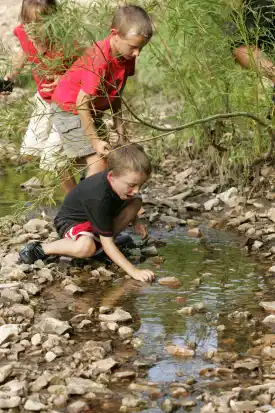
Childhood play that happens in an outdoor environment where play is unstructured, open ended and lead by the child is called nature play.
Some of the activities that children engage during nature play are ‘Climb a tree’,’Roll down a grassy hill’,’Dig in the sand’,”Climb on boulders’,’Splash in puddles’,’Follow ant trails’,’Feed the birds’,’Read books under a tree’ or just ‘Day dream’. There are infinite opportunities for nature play depending on what the child wants to do.
Nature play has a huge positive impact on children’s social, emotional, intellectual, and physical well-being.
A nature play area is a carefully designed space where children have the opportunities to play with diverse natural elements, materials and habitats. Such a natural environment supports a diverse range of children’s play experiences. It develops in children a sense of self, allows them to exercise their independence and makes them aware of the interdependence they have with their ecological world.
“Every child should have mud pies, grasshoppers, water bugs, tadpoles, frogs, mud turtles, elderberries, wild strawberries, acorns, chestnuts, trees to climb, brooks to wade, water lilies, woodchucks, bats, bees, butterflies, various animals to pet, hay fields, pine-cones, rocks to roll, sand, snakes, huckleberries and hornets. And any child who has been deprived of these has been deprived of the best part of education.” Luther Burbank
Benefits of Nature Play
- Children who play regularly in natural environments show more advanced motor fitness, including coordination, balance and agility, and they are sick less often (Grahn, et al. 1997, Fjortoft & Sageie 2001)
- When children play in natural environments, their play is more diverse with imaginative and creative play that fosters language and collaborative skills (Moore & Wong 1997, Taylor, et al. 1998, Fjortoft 2000)
- Exposure to natural environments improves children’s cognitive development by improving their awareness, reasoning and observational skills (Pyle 2002)
- Nature buffers the impact of life’s stresses on children and helps them deal with adversity. The greater the amount of nature exposure, the greater the benefits (Wells & Evans 2003)
- Nature helps children develop powers of observation and creativity and instills a sense of peace and being at one with the world (Crain 2001)
- Early experiences with the natural world have been positively linked with the development of imagination and the sense of wonder (Cobb 1977, Louv 1991). Wonder is an important motivator for life long learning (Wilson 1997)
- Children who play in nature have more positive feelings about each other (Moore 1996)
- Outdoor environments are important to children’s development of independence and autonomy (Bartlett 1996)